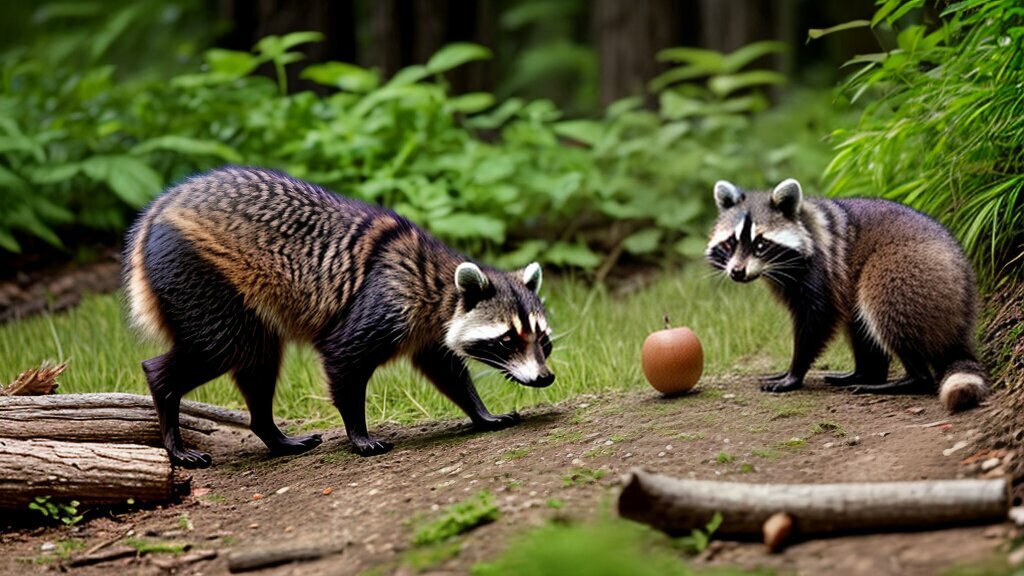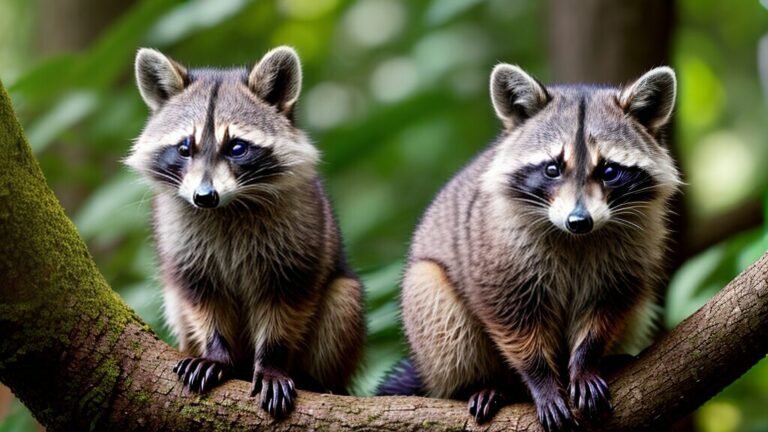What Do Raccoons Eat in the Wild? A Look into Their Natural Diet.
Raccoons are fascinating creatures that have adapted to thrive in a variety of environments. Understanding their natural diet is essential for appreciating their unique foraging habits, as well as for coexisting with them harmoniously.
In this section, we will explore the natural diet of raccoons and their food preferences in the wild. From plant-based foods to animal-based sources, we will take a close look at what raccoons consume in their natural habitat.
Key Takeaways:
- Raccoons are omnivores and have a diverse diet that includes both plant-based and animal-based foods.
- Their adaptability allows them to find and consume a wide range of food sources.
- They consume various plant-based foods, including fruits, berries, nuts, and seeds.
- They are skilled hunters and scavengers, feeding on small mammals, birds, eggs, insects, and even fish.
The Omnivorous Nature of Raccoons
Raccoons are known for their adaptability when it comes to their diet. They are omnivores, which means they consume both plant-based and animal-based foods in their natural habitat. This diverse diet allows them to take advantage of a wide range of food sources and survive in various environments.
Being omnivorous, raccoons can consume fruits, berries, nuts, seeds, small mammals, birds, eggs, insects, and even fish. Their foraging skills and dexterous paws help them locate and capture a variety of prey, while their keen sense of smell allows them to detect and locate ripe fruits and nuts.
Raccoons also have a unique ability to adapt their diet to different seasons and environments. In warmer months, they have access to more plant-based foods, while in colder months, they rely more on animal-based sources to sustain themselves.
Plant-Based Foods in a Raccoon’s Diet
Raccoons have a varied diet that includes a range of plant-based foods in addition to animal-based sources. They are opportunistic feeders and will consume whatever is available in their environment. Their plant-based diet is diverse and includes a wide range of fruits, berries, nuts, and seeds.
One fruit that raccoons are particularly fond of is the apple, and they have been known to raid apple orchards in search of ripe fruit. Grapes are another fruit that raccoons enjoy, and they will often climb fences and walls to reach them. In addition to fruits, raccoons will also eat nuts like acorns and hickory nuts.
Raccoons are also known to eat plants like corn and wild rice, and they will even nibble on grasses and sedges. They are adaptable foragers and can find food in a variety of environments, including urban and suburban areas where they may raid gardens for fresh produce.
Animal-Based Foods in a Raccoon’s Diet
Raccoons have a diverse diet that includes both plant-based and animal-based foods. They are skilled hunters and scavengers, feeding on small mammals, birds, eggs, insects, and even fish. Raccoons have adapted well to urban environments and have been known to raid bird nests and garbage cans in search of food.
These animals have sharp teeth and claws that aid them in hunting. They are nocturnal animals and use their excellent night vision to locate and capture prey. Raccoons can also swim well and hunt for fish in aquatic environments.
Foraging Habits of Raccoons
Raccoons are primarily nocturnal animals and are known for their excellent foraging skills. They use their dexterous paws to search for food, often turning over rocks, logs, and trash cans in their quest for a meal.
Due to their adaptable nature, raccoons are able to find food in a variety of habitats. They are commonly found in forested areas, wetlands, and even urban environments, where they scavenge for discarded human food and raid garbage cans.
When foraging, raccoons rely on their keen sense of smell to locate potential food sources. They are opportunistic feeders and will take advantage of any available food, whether it be plant-based or animal-based.
Seasonal Variations in Raccoon Diet
Raccoons’ diets can vary depending on the time of year. In the spring and summer, they have access to a wider range of plant-based foods. Fruits like apples and grapes, as well as nuts, seeds, and berries, become abundant in these seasons. Raccoons are opportunistic feeders, so they take full advantage of these food sources. Additionally, their omnivorous nature allows them to supplement their diet with animal-based foods such as insects, small animals, and even fish.
In colder months, however, the availability of plant-based foods decreases. In order to survive, raccoons rely more heavily on animal-based sources, such as rodents and bird eggs. They have even been known to scavenge for carrion, or already-dead animals, to give them the necessary nutrients to endure the harsh winter weather. Raccoons are opportunistic when it comes to food sources, which allows them to adapt to the changing seasons and environments in which they live.
Human Interaction and Raccoon Diet
Raccoons have adapted to life in close proximity to humans, which has influenced their dietary preferences. In urban environments, they scavenge for discarded human food, and raid garbage cans to find something to eat. Sometimes, they even consume pet food left outside. Humans have unintentionally expanded their food options, creating opportunities for raccoons to seek out human-made food sources.
However, it is important to note that intentionally feeding raccoons can lead to conflict and disrupt their natural behavior. It is recommended to avoid providing food to raccoons and to secure garbage cans to prevent them from scavenging.
Impact of Diet on Raccoon Behavior and Health
Raccoons have a varied diet that impacts their behavior and health. A balanced diet that includes both plant-based and animal-based foods ensures they receive the necessary nutrients to maintain their physical well-being. Raccoons may display different behaviors depending on their diet, for example, a diet high in fruits and berries may make them less likely to scavenge for animal-based sources.
Changes in the availability of food sources can impact raccoon populations. For example, if their usual food sources become scarce, they may be forced to search for new food sources, which can lead to conflicts with humans. Additionally, when raccoons become reliant on human-provided food, their natural foraging behaviors can be disrupted, leading to issues with human-raccoon interactions.
To maintain the health of raccoons and promote peaceful coexistence with humans, it is important to respect their natural foraging behaviors and avoid intentionally feeding them. This helps to ensure they consume a natural and balanced diet that meets their nutritional needs.
Natural Food Sources for Raccoons
Raccoons are adaptable foragers, and they obtain their food from a variety of natural sources in their habitat. They are found in many diverse ecosystems, from forests to wetlands to urban areas. Raccoons often search for their meals near bodies of water, such as streams, rivers, and ponds. These water sources provide a home to a range of aquatic creatures, including fish, frogs, and crayfish, which are all part of the raccoon’s diet.
In forested areas, raccoons search for insects, small animals, and nuts. They are particularly fond of acorns, hickory nuts, and walnuts. During the spring and summer months, raccoons consume large amounts of fresh fruits, including berries, apples, and pears. They also feed on corn, a crop that is widely grown in many rural areas.
In urban environments, raccoons rely heavily on human-provided food sources, such as trash cans, pet food left outside, and bird feeders. While it is important to limit these food sources to prevent conflict with humans, it is clear that raccoons are opportunistic feeders and will eat just about anything available to them.
Overall, raccoons have a diverse range of natural food sources, and their adaptability allows them to survive in a wide range of environments. Understanding the natural diet of raccoons and respecting their foraging habits is crucial for coexisting with them harmoniously.
Human-Raccoon Conflict and Feeding Guidelines
While raccoons are fascinating creatures, they can sometimes come into conflict with humans, especially when they become used to human-provided foods. Raccoons are skilled at finding food sources, but feeding them intentionally can disrupt their natural foraging behaviors and lead to potential issues.
If you live in an area with raccoons, it’s essential to follow guidelines to coexist peacefully. Here are some tips:
- Secure your trash cans and compost bins to prevent raccoons from raiding them.
- Don’t feed raccoons intentionally, as it can cause them to become reliant on human-provided food sources. This can lead to aggressive behavior, property damage, and potential health risks.
- Keep your pets indoors at night and feed them indoors. Leaving pet food outside can attract raccoons and other wildlife.
- Try to limit potential denning sites for raccoons on your property, such as crawl spaces and attics.
“Feeding wild animals is never a good idea. It disrupts their natural behavior and can lead to conflicts and potential health risks.”
Raccoons are fascinating creatures and are an important part of their ecosystem. By understanding their natural diet and respecting their natural foraging behaviors, we can coexist with these animals harmoniously. Remember, it’s crucial to avoid intentional feeding and take steps to limit potential conflicts with raccoons.
Conclusion
Raccoons are adaptable and resourceful animals with a diverse diet that includes both plant-based and animal-based foods. Their foraging skills and omnivorous nature allow them to thrive in various environments, from forests to wetlands to urban areas.
Understanding their natural diet is crucial for coexisting with raccoons harmoniously, and respecting their foraging behaviors helps maintain a healthy relationship. While encounters between raccoons and humans can sometimes lead to conflicts, following feeding guidelines and refraining from providing human food sources can prevent potential issues.
Ultimately, raccoons play an important role in maintaining ecosystem balance and should be appreciated for their unique contributions to the natural world.







